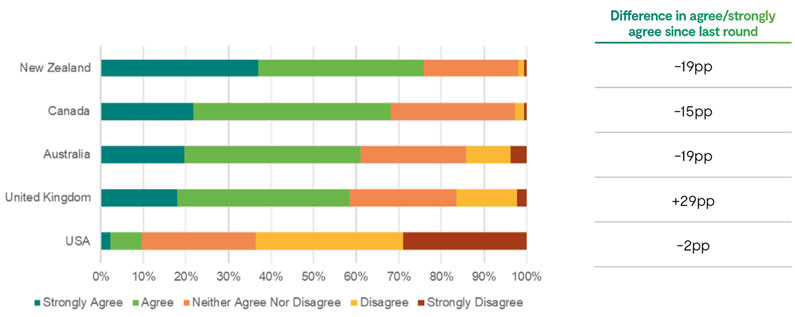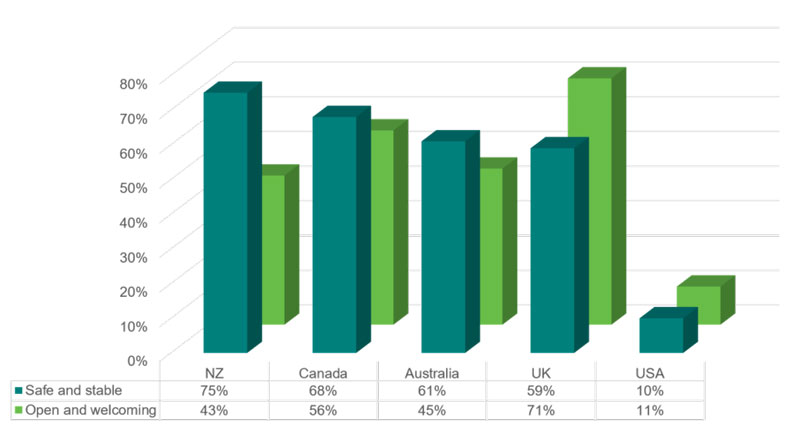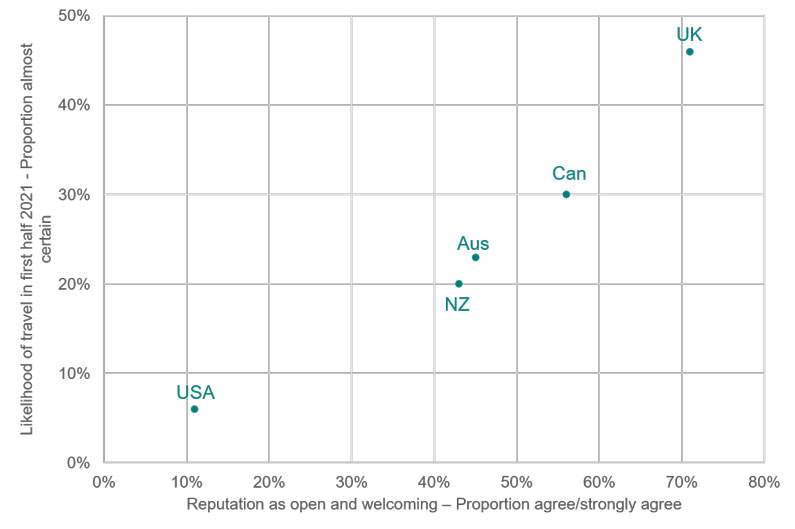Dramatic turnaround in perceptions of UK as study destination

The UK is currently the standout performer in the race to recruit international students
One of the most significant findings of the September survey is the shift in perceptions of the UK’s handling of the COVID-19 crisis. Opinions on the UK’s handling have improved substantially since the first round of research in May 2020. There has been a huge 29 percentage point improvement in agents’ responses to this question with respect to the UK.
In contrast New Zealand, Australia and Canada each saw a decline of between 15 and 20 percentage points in response to this question, representing a shift in the perceptions of agents vis-à-vis those destinations.
The positive shift in perceptions of the UK may reflect the measures taken by the UK government to bring the virus under control and the increased freedoms enjoyed by the public over the summer. (Note that the agent survey was in the field in September prior to the more recent escalation in COVID-19 cases in the UK and on university campuses in particular.)
Figure 1: Over the past two months, the way this country’s government has handled coronavirus has made it a more attractive study destination

The UK is benefitting from a shift in priorities for agents (and by extension, students), away from countries that are perceived to be ‘safe and stable’ to those that are perceived to be ‘open and welcoming’.
In the most recent survey, agents were asked to rate study destinations in terms of being ‘safe and stable’ and ‘open and welcoming’. The following figure provides a side-by-side comparison of agent ratings for both ‘safe and stable’ and ‘open and welcoming’. It is apparent that these two dimensions do not go hand in hand.
Figure 2: Proportion that agree/strongly agree that the reputation of a country as ‘safe and stable’ and ‘open and welcoming’ has improved in the last two months

While the UK lags behind New Zealand, Canada and Australia on the ‘safe and stable’ measure, it does markedly better than other destinations when it comes to perceptions of being ‘open and welcoming’.
In the survey, 71% of agents agree that the UK has improved its reputation for being open and welcoming to international students. This compares favourably to Canada in second place at 57% and is well ahead of Australia and New Zealand where fewer than half of the agents surveyed agree. Australia has an especially high proportion of agents disagreeing with the sentiment (24%).
It is Navitas’ hypothesis that this discrepancy is likely the result of agents’ assessments and expectations around the ability of international students to access each destination. Taking the two responses for ‘safe and stable’ and ‘open and welcoming’ together, the UK, despite its relatively weak score on ‘safe and stable’ ranks the highest (59% + 71%).
This would indicate that for agents, a country’s reputation as being ‘open and welcoming’ is currently more important than its reputation as being ‘safe and stable’ when it comes to its attractiveness as a study destination.
The UK leads the way in expectations for students being able to travel in the first half of 2021
In the current environment, where most parts of the world are seeing new outbreaks and second or third waves of COVID-19, it would appear that differences in the handling of the pandemic are now less influential with agents (and by extension students and parents) than expectations around the ability of students to travel to a study destination. Agent expectations around this will inform their advice to students looking to commence/re-commence studies, and as such, have the potential to significantly influence the flow of students in the short to medium term.
In the September survey, agents were asked about their expectations of when students would be able to travel to different destinations. The question asked agents to rate the likelihood that students would be able to travel to specific destinations in the first half of 2021, ranging from ‘almost certain’ to ‘very unlikely’. Given that students and parents need a high degree of certainty, the analysis of responses is focused on the proportion that reported ‘almost certain’.
The UK is currently perceived to be the most accessible education destination, with almost half of respondents believing with near certainty that students will be able to travel to the UK in the first half of 2021. The UK is followed by Canada, Australia New Zealand and the US.
Agent perceptions on the likelihood of students being able to travel to the UK could be characterised as confident optimism, while Canada, Australia and New Zealand might be characterised as hopeful optimism. This likely reflects that fact that at the time the survey was in the field these three destinations had not taken steps to open to international students (noting that Canada has since announced travel exemptions for foreign students where they are studying at an institution with a government approved COVID-19 readiness plan in place).
About 10-15% hold a pessimistic view on New Zealand and Australia, compared to less than 5% for the UK and Canada. The United States continues to trail behind other destinations on this measure, with only 6% rating a reopening as being almost certain; 45% of agents would rate being able to travel to the US as unlikely/very unlikely.
Figure 3: Do you expect students to be able to travel to the following destination countries in the first half of 2021

In the context of COVID-19, the ability to travel is an important factor in determining perceptions of being ‘open and welcoming.’ Figure 6 shows agents’ assessments of a country being ‘open and welcoming’ and their expectations of whether travel is likely to be possible in the first half of 2021.
Figure 4: The relationship between confidence in ability to travel and reputation for being open and welcoming

Our survey findings indicate that the UK is performing better than any other study destinations in the two areas that are currently having the most impact on student choices, perceptions of being open and welcoming to international students at this time, and the ability of students to travel to those destinations.
For a broad overview of the latest survey findings please see, ‘Perceptions of study destinations are changing as pandemic persists‘.
You may also be interested in what the findings tell us about the current appeal of Canada and Australia as international study destinations.